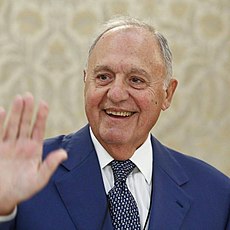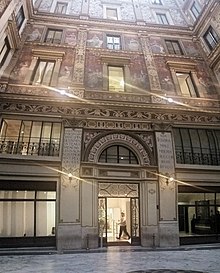
The Accademia di Belle Arti di Firenze is an instructional art academy in Florence, in Tuscany, in central Italy.

The Polizia di Stato is one of the national police forces of Italy.

The Corps of the Port Captaincies – Coast Guard is the coast guard of Italy and is part of the Italian Navy under the control of the Ministry of Infrastructure and Transport. Its head office is in Rome.

The Accademia di Belle Arti di Bologna is a public tertiary academy of fine art in Bologna, in Emilia-Romagna in northern Italy. It has a campus in Cesena.

The Accademia di Belle Arti di Venezia is a public tertiary academy of art in Venice, Italy.
The Italian Istituto Poligrafico e Zecca dello Stato (IPZS), founded in 1928, is situated at the via Salaria 691 in Rome. As well as producing coins, passports, and postage stamps for Italy, it serves the micro-states of the Vatican City, San Marino, and the Sovereign Military Order of Malta. It also publishes books under the imprint Libreria dello Stato. The O.C.V and traditional productions factory, the multimedial production institute and the Mint are also located in the capital. Another factories are located in Verrès,Val d'Aosta and Foggia, Apulia. Banknotes are produced by Bank of Italy.
This is a list of Italian Ministers of Economy and Finance since the Ministry of Economy and Finance's creation in 2001 by the fusion of three former ministries, the Ministry of Treasury, the Ministry of Budget and the Ministry of Finance.

The Ministry of Agricultural, Food and Forestry Policies, Italian: Ministero delle Politiche Agricole, Alimentari e Forestali or MiPAAF, is an Italian government department.

The Ministry of Economic Development is a government ministry of the Italian Republic. It deals with production, economic activities, energy and mineral resources, telecommunications, consumers, tourism, internationalisation and business incentives. It was formed in 2006 after the reorganization of the Ministry of Productive Activities to which were merged the Ministry of Communications and the Ministry of International Trade in 2008.

Paolo Savona is an Italian economist, professor and politician. He was Italian Minister of European Affairs from 1 June 2018 until 8 March 2019, his second stint in government after 1993–1994.

Lorenzo Arnone Sipari is an Italian nature writer and historian, author of many studies on the social and environmental history, especially on the origins and foundation of Parco Nazionale d'Abruzzo.

The Ministry of Economy and Finance, is a ministry of the Italian government. Its responsibilities include overseeing economic policy, public investments and spending. The Ministry's headquarters are located in the historic Palazzo delle Finanze. The current minister is Roberto Gualtieri of Conte II Cabinet.

Corruption in Italy is a major problem. In Transparency International's annual surveys, Italy has consistently been regarded as one of the most corrupt countries in the Eurozone. Transparency International's 2019 Corruption Perception Index ranks the country in 51st place out of 180 countries, scoring on a par with Malta, Saudi Arabia, and Grenada. Political corruption remains a major problem particularly in Lombardy, Campania and Sicily where corruption perception is at a high level. Political parties are ranked the most corrupt institution in Italy, closely followed by public officials and Parliament, according to Transparency International's. But in the 2013 Global Corruption Barometer report, Italy is in 17° position in front of the United Kingdom (18°), switzerland (21°) and the United States (22°).
The Accademia di Belle Arti di Bari is a public tertiary academy of art in Bari, Apulia, Italy.

The Accademia di Belle Arti di Carrara is a public tertiary academy of art in Carrara, in Tuscany, Italy. It was founded on 26 September 1769 by Maria Teresa Cybo-Malaspina, duchess of Massa and princess of Carrara; but its origins go back to 1757, when, on the advice of the sculptor Giovanni Domenico Olivieri, she founded the Accademia di San Ceccardo in which sculpture, architecture and painting were to be taught.
The Polizia Postale e delle Comunicazioni is one of the units of the Polizia di Stato, the State Police of Italy. Its functions include the investigation of cybercrime.

Raffaele Cantone is an Italian magistrate who has been appointed on 24 March 2014 by the Italian Prime Minister Matteo Renzi, President of the Anti-corruption National Authority. Cantone held the office until October 2019.
The National Library Service of Italy is a Ministry of Cultural Heritage and Activities promoted network of Italian libraries, in collaboration with Regions and Universities, and coordinated by the Central Institute for the Union Catalogue of Italian Libraries and Bibliographic Information.

A Ministry of the Republic of Italy is an administrative organ of the Republic of Italy, which participates in Italian public administration and is characterised by one or more specific competencies, with an organised structure, often varying over time.














